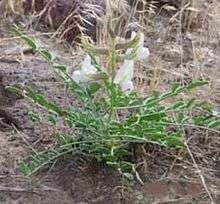Peteria thompsoniae
| Peteria thompsoniae | |
|---|---|
 | |
| Scientific classification | |
| Kingdom: | Plantae |
| (unranked): | Angiosperms |
| (unranked): | Eudicots |
| (unranked): | Rosids |
| Order: | Fabales |
| Family: | Fabaceae |
| Subfamily: | Faboideae |
| Genus: | Peteria |
| Species: | P. thompsoniae |
| Binomial name | |
| Peteria thompsoniae S.Watson | |
Peteria thompsoniae is a species of flowering plant in the legume family known by the common names spine-noded milkvetch and Thompson's peteria. It is native to the western United States, where it grows in salt desert shrublands in soils of volcanic ash origin,[1] and in alluvial fans. It is a spiny perennial herb growing from a taproot and rhizome system, its stem growing 20 to 60 centimeters tall. The leaves are made up of several pairs of oval leaflets. The inflorescence, a spikelike raceme at the top of the stem, produces white or pinkish pealike flowers up to 2.5 centimeters long, its base encapsulated in a tubular calyx of glandular sepals. The fruit is a leathery, slightly inflated legume pod up to 6 centimeters long.
References
External links
This article is issued from
Wikipedia.
The text is licensed under Creative Commons - Attribution - Sharealike.
Additional terms may apply for the media files.